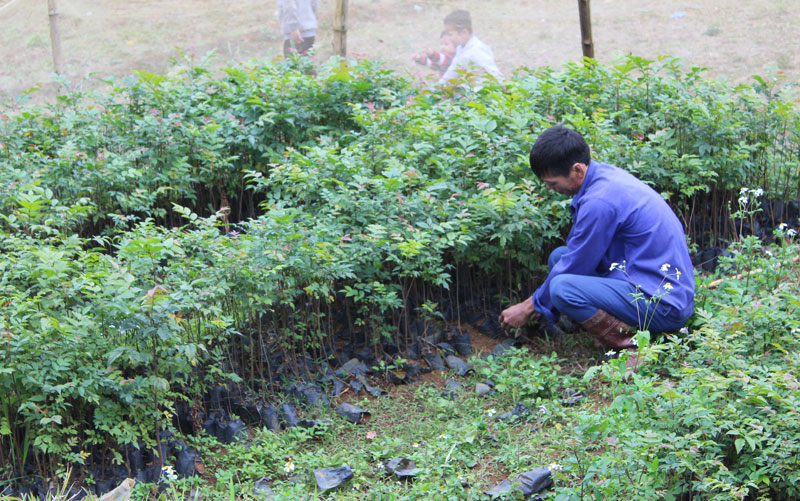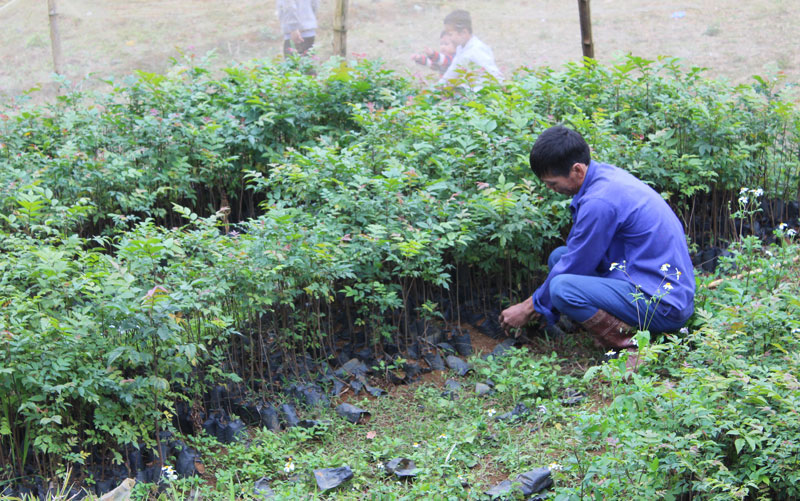
(HBO) – Lac Son district of Hoa Binh province has worked hard to popularize the Party and State policies on developing collective economy with cooperatives as a core among local people in recent years. It has also consolidated a steering committee for collective economy development and assigned tasks to its members while creating favourable conditions for the collective economy to develop. However, challenges still remain to the implementation of support policies for cooperative development.
Tung Quan
Cooperative for forest farming and processing in Vu Lam commune, Lac Son
creates stable jobs and incomes for its members
The district has 28 cooperative groups with 168
members and workers, mostly in the fields of agriculture, irrigation, and
pesticide spraying services. It is also home to eight cooperatives, including
four agricultural and four non-agricultural ones.
The cooperatives have provided different
services to meet the needs of their members and local residents, for example,
irrigation services, seed supply and farming equipment and distribution. They
have not only created jobs and improved incomes for members but also supported
local socio-economic development.
It was estimated that six communes and towns
have cooperatives following the 2012 Law on Cooperatives while the remaining 22
have none. In addition, no commune engages in a supply chain model.
In the remaining months of this year, the
district will focus on building cooperatives that work in compliance with the
2012 Law on Cooperatives. It also strives to have six new cooperatives
operating under the law and support the establishment of two supply chain
models.
The district has been developing two model
cooperatives including Tung Quang Cooperative in So hamlet, Vu Lam commune and
a chicken farming cooperative in Huong Nhuong commune. Two chicken farming
cooperatives in Huong Nhuong and Chi Thien communes are selected to join the
local supply chain.
The district established and granted business
registration certificates to four new cooperatives in the first half of 2017.
To boost the cooperative economy, Lac Son will
continue communication campaigns to make locals better aware of the role of the
cooperative economy while investing more in science and technology and
encouraging the establishment of a cooperative alliance in order to raise more
capital and recruit more members.
It will also encourage mergers of cooperatives
in the same fields or areas to increase their financial strength and expand
business scale.
The district hopes for more support from the
provincial People’s Committee and departments in training to boost cooperative
development. There should be exclusive policies designed to assist cooperatives
in each sector, especially agriculture.
According to data from the Hoa Binh Provincial Party Committee, the industrial production index for the first six months of 2025 is estimated to have increased by 20% compared to the same period last year. This marks the highest year-on-year growth rate for this period since 2020.
In the first six months of 2025, Hoa Binh province’s export turnover was estimated at 1.145 billion USD, marking an 18.11% increase compared to the same period in 2024. Import turnover was estimated at $ 804 million, a 17.15% increase, which helped the province maintain a positive trade balance.
The lives of the ethnic minority farmers in Tan Lac district have gradually improved thanks to the new directions in agricultural production. This is a testament to the collective strength fostered through the professional associations and groups implemented by various levels of the district’s Farmers’ Union.
With the motto the "product quality comes first,” after nearly one year of establishment and operation, Muong village’s Clean Food Agricultural and Commercial Cooperative, located in Cau Hamlet, Hung Son Commune (Kim Boi district), has launched reputable, high-quality agricultural products to the market that are well-received by consumers. The products such as Muong village’s pork sausage, salt-cured chicken, and salt-cured pork hocks have gradually carved out a place in the market and they are on the path to obtaining the OCOP certification.
In the past, the phrase "bumper harvest, rock-bottom prices" was a familiar refrain for Vietnamese farmers engaged in fragmented, small-scale agriculture. But today, a new spirit is emerging across rural areas of Hoa Binh province - one of collaboration, organisation, and collective economic models that provide a stable foundation for production.
Maintaining growing area codes and packing facility codes in accordance with regulations is a mandatory requirement for agricultural products to be eligible for export. Recently, the Department of Agriculture and Environment of Hoa Binh province has intensified technical supervision of designated farming areas and packing facilities to safeguard the "green passport" that enables its products to access international markets.



